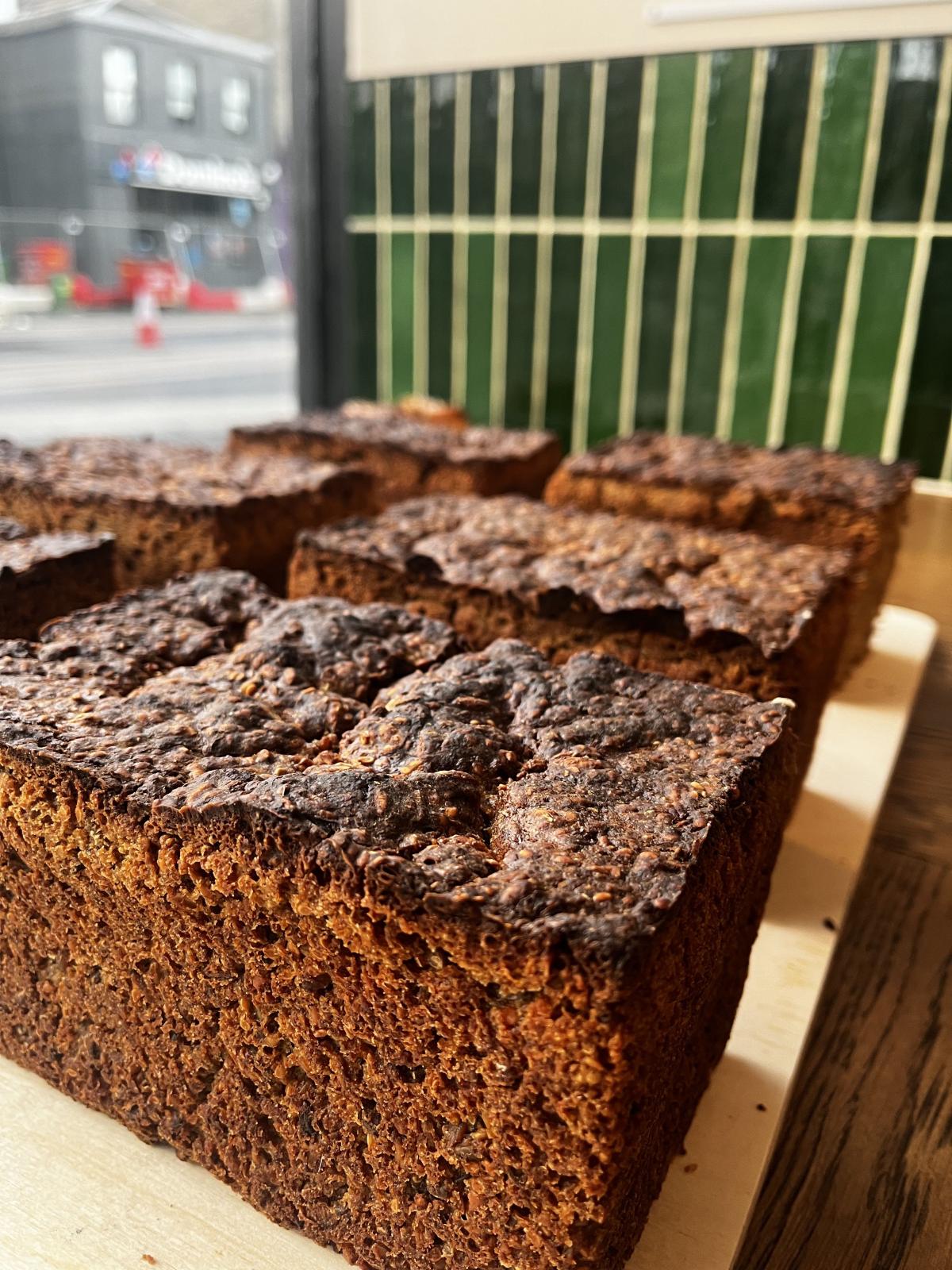
100% Rye Crumbling When Cut

Bakery owner from Edinburgh, UK here (Hobz Bakery if anyone's interested).
I've been trying to develop a 100% rye tin loaf for a few months now. Started off with the Rene's Rye recipe in Tartine Book no. 3, and have adapted it slightly. Basically, it's 50% fresh milled whole rye, 50% medium rye, 36% buttermilk, 80% water, 27% beer, 62% rye leaven, with a healthy mix of cooked rye berries and seeds. Tartine's recipe isn't 100% rye. Nonetheless, I've had the same problem with every bake. Even after an hour and a half in a 220C oven, and an inside temp of over 100C at the end of bake and leaving it uncut for around 20 hours, the inside is still moist. More annoyingly, it doesn't cut nice, thin slices.
I mix, then bulk proof for about 2-3 hours, divide into tins, proof for another 2-3 hours, into the fridge overnight, then bake from cold about 18 hours later. Could I be over fermenting the dough? Or not baking it enough? Over hydration?
I'm very new to rye bread - didn't much like them until I worked at Hart in Copenhagen for a bit.
Attached one picture of the rye - can't find any of the crumb I'm afraid.
Any tips would be appreciated!
Matt


Can be a few thing. Could be the acidity of the bread. I think under would make it gummy and over would make it crumbly. Might be in the bake itself. Or over proofed.
I think if you're a professional bakery, if you haven't already, it would be a good idea to invest in a digital pH reader.
I would say it's more likely that it's over than under, but the loaf comes out both gummy (to an extent) and crumbly.
Definitely need to buy a pH reader, mostly for panettone - just need to justify the price first,
Just a guess here (based on experience) - but it sounds like you are over cooking to fix a starch attack. I'm with Abe; I'd check my acidity. How are you cooking the rye berries and seeds? in a scald?
Cooking the rye berries in a pot of (low) boiling water for about 30-45 minutes. Seeds aren't cooked (sorry, maybe my phrasing made it sound like I cook them).
Could I ask what you mean by 'over cooking to fix a starch attack'?
Maybe I should just try to proof for much less, or add less levain.
happens when the amylase activity turns too much of the starch in the dough to sugars. The buttermilk, sourdough, long ferment and low fermentation temperatures are designed to lower the PH and retard amylase activity.
A symptom of starch attack is gummy crumb. Checking your PH can eliminate that possibility and expose others.
Hi Matt, I used to live in Edinburgh just until last year, nice to "meet" you!
A picture of the crumb could be helpful!
Crumbly rye crumb is generally a sign of too much acidity. Your times sound quite long for rye, especially with high inoculation like you have. Are you fermenting it warm? Rye likes warmth, at least 28C at all stages (including the levain), and the later in the process the higher (around 30 bulk, and 32-35 final would be great). This can help a lot with the texture of the crumb.
Also you have both sourdough, buttermilk, and beer, all acidic liquids, you might be introducing too much sourness from the beginning.
And overhydration is entirely possible for the moistness of the crumb - your hydration is very high!
Ilya
Hi Ilya!
Yeah I'm starting to think the fermentation time is quite long now - and you're right, the buttermilk and beer don't help lessen the acidity from the long ferment.
at 163% hydration, not counting the water in the cooked grains and seeds. You might have more success if you dialed back some of the liquids and baked longer at a lower temperature. Then let the bread sit longer than 24 hours to permit the moisture in the loaf to equalize throughout.
Fermentation times are also extremely long for an all-rye bread. I’d expect something around 2-3 hours total and no retarding, given the 62% leaven. How are you gauging the paste’s fermentation progress?
Keep experimenting.
Paul
It is a high hydration, but I had already dialled it down from Robertson's recipe in Tartine No.3.
I think I'll try a same day mix and bake, with no retarding. It's either that, or do an overnight cold retard but with much less inoculation, maybe 20%. I'll try again this week!
Sourdough baking is incredible; you always find new challenges!
Made my toes curl. I agree to a straight bake w/o retarding to see what happens. Like the lofty looking loaves and bumps. Do you like flat tops? Our would you prefer a slight dome? Maybe the loaves are too big. What about narrower loaves? Or both narrow and tall. Something to be said about that old fashioned type of tin for 100% rye.
Agree on over cooking.
Where exactly does the rye flour come from? UK, Scandinavia, Germany?